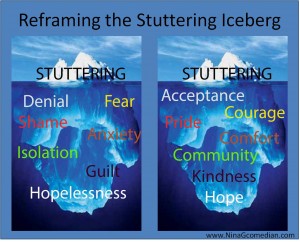Weekend Wrap-ups: Bringing together all of our thoughts into how we view ourselves as therapists, our contributions to the professional mental health and speech language world
Reframing the Stuttering Iceberg
As a mental health counselor who stutters, I believe I have insights that I don’t always see represented in counseling theories that are supposed to describe the stuttering experience. I have always found Dr. Joseph Sheehan’s description of the stuttering iceberg to be helpful, that the stuttering itself is the biggest issue but really the issues are underneath: shame denial, fear, shame, anxiety, isolation, guilt, and hopelessness.
In graduate school I learned that you should really look at a problem from every perspective. If you examine something from different perspectives it can give you insights. The more that I became involved in the stuttering community, the less I felt that Sheehan’s iceberg fit me. Was my iceberg suffering from a global warming of self-acceptance and shrinking? No, that didn’t seem to be it. It felt like it was the same shape and depth but it felt like there was something else under the surface.
 The iceberg on the right represents this change. Denial has been replaced by acceptance, fear with courage, shame with pride, anxiety with comfort, isolation with community (and what a community it is!!), guilt with kindness and hopelessness with hope. It isn’t enough to name the psycho-social difficulties we experience because of stuttering. We must know what the alternatives to these problems are. What does it look like if we don’t feel guilt? Are not isolated? For the ourselves, people we counsel, and the outreach we do, I think it is important to demonstrate what icebergs can look like and how to best empower people to shape their icebergs the ways that fit them best.
The iceberg on the right represents this change. Denial has been replaced by acceptance, fear with courage, shame with pride, anxiety with comfort, isolation with community (and what a community it is!!), guilt with kindness and hopelessness with hope. It isn’t enough to name the psycho-social difficulties we experience because of stuttering. We must know what the alternatives to these problems are. What does it look like if we don’t feel guilt? Are not isolated? For the ourselves, people we counsel, and the outreach we do, I think it is important to demonstrate what icebergs can look like and how to best empower people to shape their icebergs the ways that fit them best.
Nina G
Weekend, October 17 & 18, 2015
![]()

Nina,
Thank you so much for sharing your thoughts. I loved reading your take on Dr. Joseph Sheehan’s iceberg description. I am currently a graduate student in a speech-language pathology program and we have discussed this iceberg in class several times. It has really helped me understand that the weight of stuttering is not only in a person’s disfluencies, but rather the feelings disfluencies can generate. I really enjoyed your explanation that rather than completely chip away at the mass of the iceberg “under the water” we can encourage our client’s to think about changing it. I will definitely use your wise words in the future. Thank you again!
-Lauren Carranza
Thanks so much Lauren! Best of luck in your work as an SLP.
Nina,
Thanks for the reminder about the Stuttering Iceberg. I find this analogy extremely useful as a reminder of all the activity below / inside. The image alone is invaluable.
Elizabeth Kapstein
Thank you, Nina, for your new take on the stuttering iceberg. Through the years this analogy has been extremely useful to me.
Even having gained acceptance of myself as a person who stutters, i still have negative feelings at times. I appreciate your innovative way of thinking about the different aspects of the iceberg, which help address the many sides of this nuanced topic.
Excellent post. Thank you, Nina